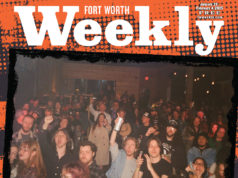Most people in the Fort probably didn’t even know there was a day labor center in town. If they did, they probably didn’t know it was just off I-30 at the end of the street where the church with that crazy slanted roof is. But to a lot of people over the last several years, it was an important place. For me, it was a last resort not long after I arrived in Fort Worth from New York in 2002 and found myself out of work and unable to pay the mortgage on my little home, and barely able to feed my kids. I struggled with some freelance work through 2002 and 2003, sold my first story to the Weekly in early 2004, but was about to go under. I applied for regular jobs, but who wants to train someone for a factory when you know they’re going back to journalism as soon as they can? So I wound up at the Day Labor Center in early 2004. It was run by a fellow named Warren, a good and fair man. The fellows and women would show up starting at about 6:30, waiting for the doors to open. You took a number and waited your turn for a contractor or someone who needed a few hands to mow some lawns to come in asking for help. Pay wasn’t great: Warren insisted that everyone get paid at least $7 an hour, and sometimes people offered $9 or $10.
I spent five weeks there and got out to work just three days. Some guys who were known to the contractors got out a lot more often. But not making much money didn’t really matter. What mattered about the place was that it gave me and a lot of other guys a place to be. It kept us from sitting at home or for the homeless, on the street all day. It allowed us to interact with humanity rather than stewing over being left behind by society.
It wasn’t much of a place: Couple of big rooms with cheap chairs; lousy coffee that cost a dime a cup; couple of newspapers and some magazines and books. Sometimes church groups came in and served free lunch–universally awful but still thoughtful.
The guys and women ranged from junkies to crazies to people hiding under the radar to avoid going to jail for non-payment of child support all the way to white collar people who simply lost their jobs and had nowhere else to turn. They were a good group, a good mix.
I wound up writing a story about the experience and that helped land me a job at this paper. Other guys wound up working regularly on construction crews that were booming then.
The city closed the center’s doors today because the budget couldn’t afford the couple of hundred grand it cost to run the place annually. That’s too bad. Every city needs a place of last resort for people willing to work but down on their luck. There’s talk of trying to find a new location for it. We’ll see.
In the meantime, there are a couple of hundred willing hands who won’t have a place to go grab a hot shower and lousy coffee and maybe claim a $60 payday so that they can put a chicken on the table for their kids. That’s sad. You would think our city would understand the value of a place like that.











Nice perspective Peter.
There are private-sector labor pools, and the labor market will not disappear because of the closure of one job center.
I’ve been on the other side of the situation you describe a lot, and as the job market gets tighter for all classes of employment, employers are less willing to risk hiring from an agency that doesn’t screen – not even for digging ditches.
The liability outweighs the savings, especially in a flat economy with a smaller workforce and greater Fed focus on employers. The boom is over, everyone can go home now.
No the labor market won’t disappear. What’s disappeared was a pretty well coordinated place to get good, sober hands, with a record of who when out with whom and what they were going to get paid.
Since I posted this I’ve already had a couple of personal emails asking what street corners are being used as laborer gathering spots. So I don’t think there is a shortage of need for cheap day labor; I just think there was short-sightedness on the part of the city council and the mayor for not realizing the value of this place. Those guys are now going to be in the street all day–many of them anyway–and that’s not going to please a lot of people.
I don’t think the city did this maliciously; I know there is a genuine budget shortfall. But just as in their thoughts that they could close community centers and pools, this is another relative pittance saved at the cost of a great deal to another group of poor people.
If the city of Fort Worth did what Burleson does–which is to charge gas companies in advance for street use by their trucks–a lot of money going to street repairs could have been used to save more of the programs for the poor. But that would have been asking the rich to pay for the street damage they cause, and god forbid we’d do that. Better save a sheckel or two off the poor guys; who needs them anyway?
“What’s disappeared was a pretty well coordinated place to get good, sober hands…”
“The guys and women ranged from junkies to crazies to people hiding under the radar…”
Choose one?
Not to belittle the positives you cite – your 35 days there did result in almost a ten percent gross return, and presumably it was much better for regulars.
The funding decision was most likely made due to that sustainability thing, but I’m not privy to FW politics, I don’t know.
OTOH, you’re a journalist paid to find out. What happens to the people you befriended at the job center when it closes? That is interesting reading, tell their stories.